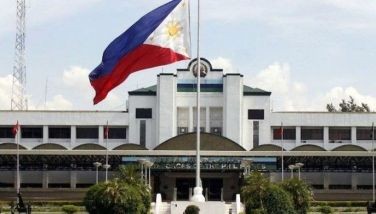Priest asks CBCP to push for partial poll automation
February 17, 2007 | 12:00am
A senior Jesuit priest from Cebu appealed to the Catholic Bishops’ Conference of the Philippines (CBCP) to stand firm in its stance to push for the partial automation of May 14 elections despite the government’s final decision to revert to manual counting for lack of time.
In his letter to the CBCP, Fr. Emmanuel Non asked the bishops to urge the government to reconsider poll automation, saying this is crucial in the campaign for credible and peaceful elections.
The 82-year-old priest said the reasons cited by the Commission on Elections (Comelec) in thumbing down poll automation like lack of time and resources were simply invalid.
Non said the Comelec did not consider computer firm Mega Data Corp.’s (MDC) contention that there is enough time to prepare for partial automation in a span of three months.
He also said funding should not pose a problem because MDC is offering its services and resources for free.
"We all agreed that credible elections is the grave need of the hour. But automation of elections is the rock bottom necessity for clean and honest elections.
We can have partial automation if only Comelec gives nod to demonstration of Filipino ingenuity, expertise and technical know-how," Non said in his letter obtained by The STAR.
He believes automation could be a mechanism that could effectively prevent cheating during elections as well as protect teachers and election volunteers from threats and harm.
"Most important of all, with God looking down on us and with the whole world observing, we Filipinos can now get rid of the tag that we are a nation of cheaters, unreliable, untrustworthy, wheeler-dealers, doble-cara, changing horses in midstream, dishonest, deceitful, devious, fraudulent and mendacious people," he noted.
Non’s appeal was supported by Caloocan Bishop Deogracias Iniguez Jr. who said it was the wish of the bishops for the election process to be modernized.
"This has been the wish of the bishops – for the election process to be modernized. If national resources could afford such positive development, then we see no problem with it," Iniguez told The STAR.
The implementation of the new law for the May elections will be limited to six pilot provinces and six highly urbanized cities in Luzon, the Visayas and Mindanao.
The Comelec will choose these areas with the consent of the respective local councils.
Local government units whose officials have been the subject of administrative charges within 16 months prior to the May 14 elections will not be chosen for the pilot automation. Nationwide implementation of poll automation, meanwhile, shall take place in 2010.
Meanwhile, Sen. Richard Gordon insisted the Comelec implement the poll automation law and at the same time, thumbed down Internet voting.
"It is not too late to implement the poll automation. Internet voting is illegal because there is no law to support its implementation. It did not undergo a bidding process.
If they were able to do it, why not exempt Botong Pinoy from the bidding?" he said during yesterday’s demonstration of the Botong Pinoy automated voting software developed by Mega Data.
Gordon said he would call for a hearing at the Senate next week about the Internet voting that the Comelec wants to implement during the May 14 polls.
He also suggested to Comelec to utilize Botong Pinoy in the first four pilot areas, and the other available systems in the remaining eight provinces and cities that are required by the law to have a testing of automated elections systems that could be used nationwide for the 2010 presidential elections.
Botong Pinoy software was successfully tested by 300 voters in Barangay Holy Spirit in Quezon City, an indication that it can be used by people with little training, Gordon said. – With James Mananghaya
In his letter to the CBCP, Fr. Emmanuel Non asked the bishops to urge the government to reconsider poll automation, saying this is crucial in the campaign for credible and peaceful elections.
The 82-year-old priest said the reasons cited by the Commission on Elections (Comelec) in thumbing down poll automation like lack of time and resources were simply invalid.
Non said the Comelec did not consider computer firm Mega Data Corp.’s (MDC) contention that there is enough time to prepare for partial automation in a span of three months.
He also said funding should not pose a problem because MDC is offering its services and resources for free.
"We all agreed that credible elections is the grave need of the hour. But automation of elections is the rock bottom necessity for clean and honest elections.
We can have partial automation if only Comelec gives nod to demonstration of Filipino ingenuity, expertise and technical know-how," Non said in his letter obtained by The STAR.
He believes automation could be a mechanism that could effectively prevent cheating during elections as well as protect teachers and election volunteers from threats and harm.
"Most important of all, with God looking down on us and with the whole world observing, we Filipinos can now get rid of the tag that we are a nation of cheaters, unreliable, untrustworthy, wheeler-dealers, doble-cara, changing horses in midstream, dishonest, deceitful, devious, fraudulent and mendacious people," he noted.
Non’s appeal was supported by Caloocan Bishop Deogracias Iniguez Jr. who said it was the wish of the bishops for the election process to be modernized.
"This has been the wish of the bishops – for the election process to be modernized. If national resources could afford such positive development, then we see no problem with it," Iniguez told The STAR.
The implementation of the new law for the May elections will be limited to six pilot provinces and six highly urbanized cities in Luzon, the Visayas and Mindanao.
The Comelec will choose these areas with the consent of the respective local councils.
Local government units whose officials have been the subject of administrative charges within 16 months prior to the May 14 elections will not be chosen for the pilot automation. Nationwide implementation of poll automation, meanwhile, shall take place in 2010.
Meanwhile, Sen. Richard Gordon insisted the Comelec implement the poll automation law and at the same time, thumbed down Internet voting.
"It is not too late to implement the poll automation. Internet voting is illegal because there is no law to support its implementation. It did not undergo a bidding process.
If they were able to do it, why not exempt Botong Pinoy from the bidding?" he said during yesterday’s demonstration of the Botong Pinoy automated voting software developed by Mega Data.
Gordon said he would call for a hearing at the Senate next week about the Internet voting that the Comelec wants to implement during the May 14 polls.
He also suggested to Comelec to utilize Botong Pinoy in the first four pilot areas, and the other available systems in the remaining eight provinces and cities that are required by the law to have a testing of automated elections systems that could be used nationwide for the 2010 presidential elections.
Botong Pinoy software was successfully tested by 300 voters in Barangay Holy Spirit in Quezon City, an indication that it can be used by people with little training, Gordon said. – With James Mananghaya
BrandSpace Articles
<
>
- Latest
- Trending
Trending
Latest
Trending
Latest
Recommended































